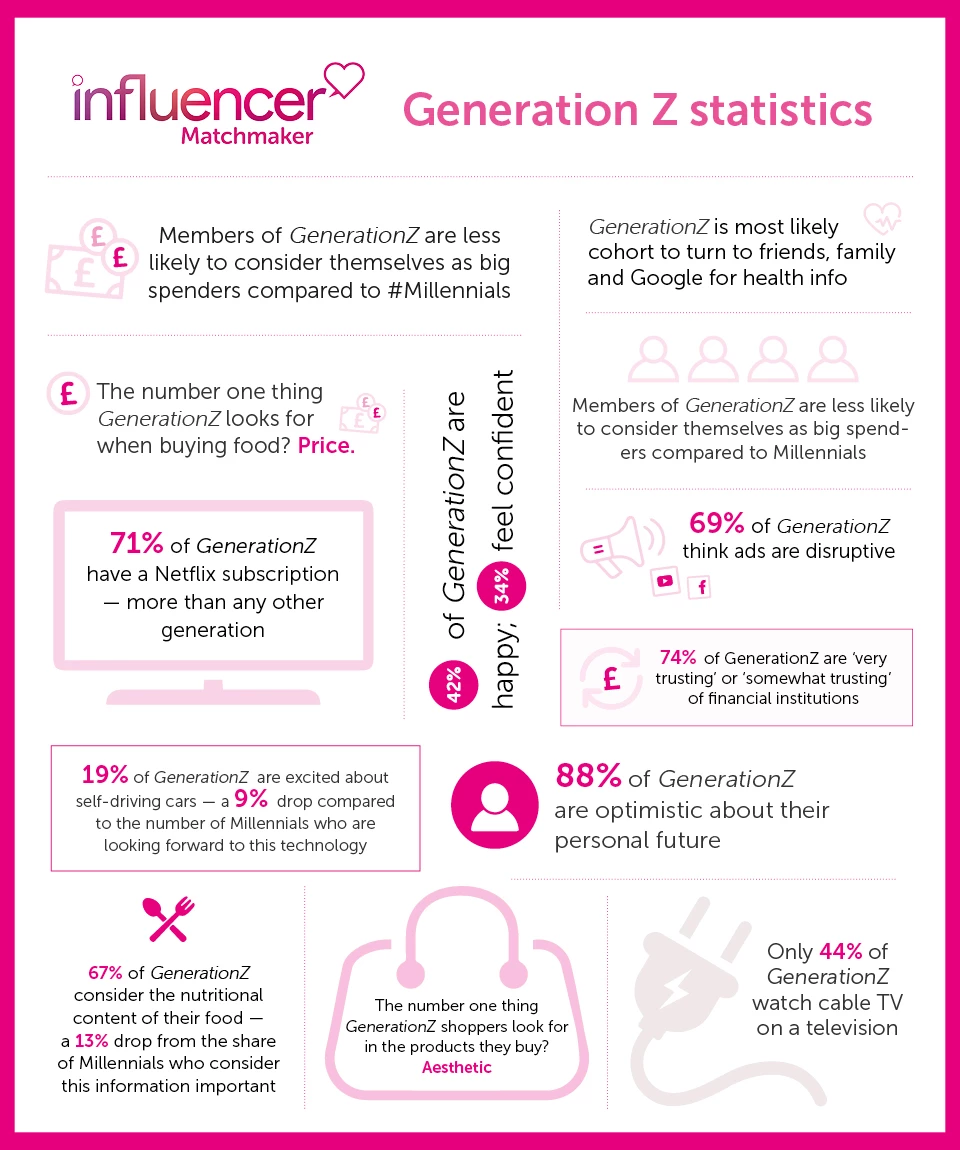Generation Z categorises those born between the mid-1990s and early 2000s. The group is not to be confused with millennials, as they have very different behaviours, habits and attitudes. Whilst there are a variety of characteristics that define them, the most distinguishable one is that Gen Z are the first to grow up with constant access to the internet.
Gen Zers grew up dancing along to MTV music videos in their living rooms and staying connected to friends in MSN chat rooms. MySpace and Bebo gave them platforms of their own from a young age, where content, posting, liking and following became second nature. They are as digitally literate as it gets.
As the generation grows up, their impact on society and the economy will only increase. Currently, their global purchasing power stands at $44 billion but, in the next two years, this figure is predicted to quadruple. They are a demographic that businesses cannot afford to ignore.
And, with the group spending almost three hours on social media each day, an hour longer than the average millennial, and over half of them admitting that social media is their greatest source of influence, there’s little debate on where best to target them. But the success lies in the how – with greater understanding of and reliance on digital channels, marketing to this digital-savvy generation requires some special thought.
1 - The Power of Influencers
Influencer marketing has grown in value over recent years and many brands are now migrating from partnerships with celebrity A-listers and sporting heroes to the use of social media influencers, who are high-profile individuals whose popularity, prominence and power has grown through digital content creation. Influencers are defined by their follower count, niche area of expertise (e.g. fashion, gaming, lifestyle etc.) and their commercial viability.
The global village effect created by their online communities makes followers, each of which is a consumer, feel as though any recommendations from the influencer are more like advice from a friend than a strategic marketing ploy.
Unlike traditional celebrities or sports stars, influencers come across as real people, which is what gives them power and resonates with the 67% of Gen Zers who prefer to see real people in advertisements.
Although an influencer association has the potential to do wonders for your brand image, the widespread understanding that digital celebs receive money in exchange for posts means transparency is vital for the success of a partnership and for gaining consumers’ long-term loyalty.
But, with channels like Instagram and YouTube used most by Gen Zers, a partnership with an influencer leveraging those platforms has the potential to get your brand or product greater exposure among your target market.
2 - Create Authentic and Meaningful Ads
Their understanding of the internet means that little gets past Gen Z, which only reinforces the need to be transparent and authentic when targeting your message at them. And, whilst sponsored content is important to raise brand awareness and drive engagement, over-reliance on this form of advertising can have the opposite effect.
Despite spending over seven hours a day on their smartphones, Gen Zers will rarely sit through ads or interact with paid-for posts, if they do not add any real value to their lives. And, having lived most of their lives with easy access to the internet, the value they seek tends to be readily available at the tap of a screen.
Consumers already flock to these influencers for a reason, whether that’s for entertainment, advice or a tutorial. No matter what it may be, it’s important for brands to trust the influencer’s knowledge of their audience and ability to create content that they will engage with.
3 - Make Your Business Instagrammable
Instagram is the most popular social media platform amongst Gen Z and, largely due to the significance of influencers, being Instagram-worthy is deemed fashionable and praise-worthy in their eyes. Although people have historically always been conscious of what others think of them, this has only been heightened on the digital platform.
Therefore, simply having a presence on Instagram is no longer enough, if brands really want to tap into its potential to strengthen their image and offering and attract new customers. Rather, your Instagram content must reflect the essence of the brand, instead of just acting as a shopfront for your products. Ultimately, consumers must feel that their reputation will be enhanced by associating with you on the social media platform.
According to Y Pulse’s statistics, 41% of 13-34-year olds have done something just to get a photo of it on social media. So, your focus should be on making every touchpoint Instagrammable so that consumers can’t help but snap a picture or two to add to their own personal profiles.
4 - Experiences are the New Cultural Currency
Having grown up during the credit crunch, Gen Zers attribute greater social currency to unique experiences than new possessions. And, with social media influencing a lot of their behaviours and preferences, a survey by Y Pulse suggests that 91% of their Gen Z respondents would rather share a picture of an event on social media than buy new clothes or accessories.
The digital-savvy group know they can buy anything they could possibly need on the internet, with online stores, such as Amazon offering them a convenient one-stop shop. As a result, experiential retail experiences are on the rise, with most shopping centres now providing entertainment activities, such as cinemas and bowling alongside their retail offering.
But, for retailers, there is a real need to offer something beyond the traditional in order to target those living within the experience economy. For example, Nordstrom has taken moves to reinvent the department store model, one of Gen Z’s least favourite places to shop, with the launch of its no-inventory stores. Instead of selling products, they sell services, such as fitting, returns and collections, things the generation can’t do online.
5 - They’re a Multi-Channel Generation
Whilst the high street faces an uncertain future, having already said goodbye to brands, such as BHS, and with others on the brink, ecommerce is on the rise. And COVID-19 has only accelerated the process by forcing many more of us to get accustomed to the digital world.
However, although 55% of Gen Zers would rather buy clothes online and a further 53% preferring to purchase books and electronics from ecommerce providers, a staggering 88% of the group still prefer omnichannel brand experiences.
So, whilst your online offering should not be neglected, an offline strategy that complements digital activity will be the most successful way to target the generation.
6 - It’s Not What You’re Selling, It’s What You Can Do For Them
Gen Z are more than just consumers. They have watched and helped countless individuals become high-profile social media influencers. And, aware of the great fortune that can bring, they truly believe they can do the same.
The influencer field is still in its infancy and brands and marketers are still trying to understand its value. But as it evolves new concepts, such as micro and nano influencers, are emerging whereby even those with smaller follower counts can be valuable ambassadors for brands.
Therefore, the generation could well provide you with access to new customers, so the way you interact, empower and collaborate with them should always be a consideration.
7 - Keep It Short and Sweet
In both the online and offline world, we are inundated with messages from brands. But with the average attention span of Gen Z consumers only eight seconds, you have a very limited window to capture their attention and get your message across.
And, of course, ensuring your message breaks through all the white noise will require something that is clear, engaging and useful.
8 - Practice What You Preach
Compared to generations before them, Gen Zers are typically more morally driven in their habits. They possess characteristics of activists and doers and place greater emphasis on actions brands are taking to combat issues, such as climate change, rather than blindly believing their marketing ploys.
A study has shown that 76% of the generation were concerned about humanity’s impact on the planet and 60% want their jobs to impact the world. For a lot of them, making a real change is important.
Therefore, being able to prove your investment in meaningful work will help build a brand that the generation will favour and stand by throughout their lives.
Overall, it’s important for brands to realise the power and significance of winning over this generation of consumers. As they grow older and gain greater independence, their buying habits are set to transform the markets we know today.
Although it’s harder to excite them, get their attention and cater for their every demand, they will no doubt be a key determining factor in your future success. Ultimately, if targeted right, they can become some of your most loyal and profitable customers.
And, with social media offering a valuable channel to reach them, influencer marketing can be a great way to widen your reach, raise brand awareness and boost engagement. But ensuring your campaigns are authentic and effective is key for their success.
To find out how Influencer Matchmaker can help you with finding the perfect influencer that not only represents your brand and product but also has access to the right audience, contact us today.









